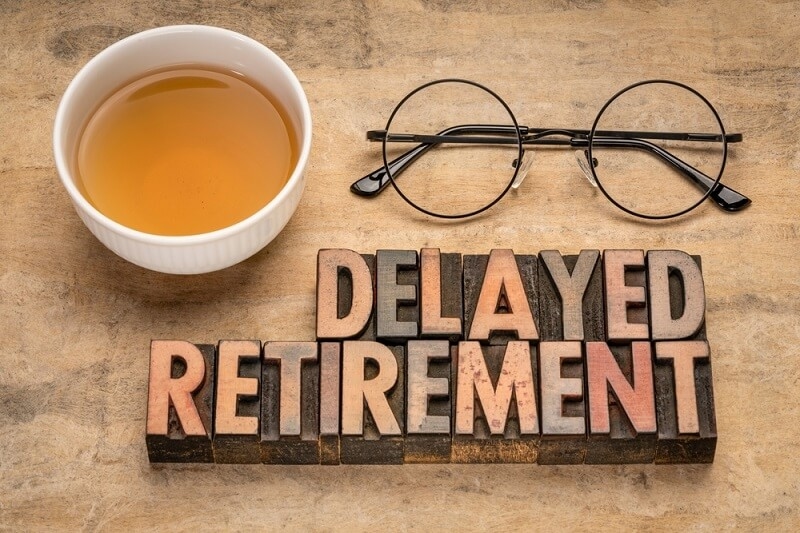
Retirement has always carried a kind of myth. That golden date when you hang up your work shoes, sit back, and finally relax. For generations, people counted down the years and marked the day on calendars. But here’s the truth no one tells you: retirement doesn’t always look like the dream we imagine. And more people are starting to ask themselves, “Should I wait just a little longer?”
Delaying retirement benefits might sound like putting off freedom, but it isn’t always a bad thing. In fact, it can open doors — financial, personal, even emotional. Let’s talk through five very real reasons why waiting could be the smartest choice you’ll ever make.
Money may not buy happiness, but it does buy peace of mind. The longer you stay in the workforce, the longer you keep earning. That extra income means you’re not dipping into your savings too early, and every month you hold off on collecting Social Security usually increases the size of the checks you’ll get later.
Imagine you’re planning your retirement 2025 and considering whether to claim benefits right away. Pushing it back even a couple of years can mean more growth in your nest egg, especially if you’ve got investments earning compound interest. And if your employer still covers health insurance, that’s another massive expense you won’t need to worry about immediately.
The math is simple: delay a little now, and you’re better protected for the long haul.
Not everyone feels ready to stop working at sixty-five. These days, people live longer, stay healthier, and remain active well into their seventies. Work can provide structure — a routine that keeps the mind sharp and the body moving. It’s not just about staying busy, it’s about staying well.
Plenty of people discover that they miss the rhythm of the office or workshop once they leave it. For them, working past retirement age isn’t a burden, it’s a blessing. They stay mentally engaged, socially connected, and physically active. Retiring too soon, on the other hand, can sometimes lead to restlessness or even a decline in health.
If you feel good and enjoy what you’re doing, why rush the exit?
There’s a surprising trend in the workforce right now. People retire, and then a year later, they’re back on the job. Sometimes it’s money pushing them back; sometimes it’s boredom or loneliness. These unretiring trends are real, and they highlight one thing clearly — many people leap into retirement before they’re truly ready.
By delaying, you sidestep the cycle of leaving, regretting, and returning. You give yourself time to prepare both financially and emotionally. When you finally do walk away, it feels permanent and positive rather than rushed or uncertain.
And employers often appreciate it too. Experienced workers who stay on bring stability and mentorship to younger staff. It’s a win-win.

Here’s the part people rarely say out loud: retirement doesn’t have to mean slamming the brakes. It can mean slowing down instead of stopping. Maybe you cut back your hours, consult part-time, or take on projects you enjoy.
Delaying benefits gives you the breathing room to shape your own version of retirement. If you’re eyeing retirement 2025, you could use those extra years to test the waters — work fewer days, experiment with hobbies, even start a side business. You’ll know what you want before making it official.
This softer landing into retirement is becoming more common, and honestly, it makes sense. It’s not about following tradition. It’s about building a lifestyle that works for you.
Related Resource: Learn About Employer Pension Plans and How They Affect You
Work isn’t only about paychecks. It’s also about legacy. Staying a bit longer gives you the chance to mentor younger colleagues, finish projects you’re proud of, and walk away with closure.
Think about it. You spend decades building skills, relationships, and knowledge. Walking out too early sometimes feels like dropping the ball. But sticking around for a few extra years allows you to wrap things up, share your expertise, and leave behind something lasting.
For some, this is the most rewarding part of delaying retirement. You’re not just saving more money. You’re adding meaning to the years before you step away.
Of course not. Some people can’t wait to leave the nine-to-five behind. If health is failing, if family needs more of your time, or if the job has lost all joy, then sooner might be better. Retirement isn’t one-size-fits-all.
The key is to know your situation. Delaying isn’t a rule — it’s an option. For some, it’s the path to stability. For others, it’s unnecessary.
If you’re undecided, ask a few simple questions:
Do I enjoy my work, or am I forcing myself through it?
Do I have enough saved if I step away today?
What will I actually do with my time if I retire now?
Will my health benefit from staying active or from slowing down?
The answers might surprise you. And they’ll give you clarity on whether waiting is the right choice.
It’s easy to focus only on money, but there’s another layer to all this: people. Workplaces are social. Colleagues often become friends, even second families. Walking away too early can sometimes feel like stepping into silence.
That’s why working past retirement age has more than just financial perks. It keeps people connected. For many, those daily chats, team meetings, or coffee breaks matter as much as the paycheck.
And if you wait to retire until you’re truly ready, you’re less likely to feel that sudden drop-off in connection.
Those growing unretiring trends show us something clear: rushing can backfire. Too many people retire, realise they miss the structure or the income, and scramble to re-enter the workforce. That transition isn’t always easy — especially when employers are wary of hiring retirees who change their minds.
Delaying can help avoid the “what if” stage. You walk into retirement fully ready, with fewer doubts and fewer regrets.
Worth A Look: Loud Budgeting: Why This Trendy Method Actually Works
Delaying retirement benefits isn’t about putting off joy. It’s about buying yourself options. Options to save more, to stay healthier, to leave work with a sense of pride rather than panic.
For some, waiting means more stability. For others, it means staying connected a little longer. And for many, it means retiring on their own terms — not because tradition or a date on the calendar says so.
So if you’re weighing your choices as retirement 2025 gets closer, don’t feel pressured by anyone else’s timeline. Ask the hard questions. Trust your gut. Because sometimes, the best way to step into freedom is to pause a little longer first.
This content was created by AI